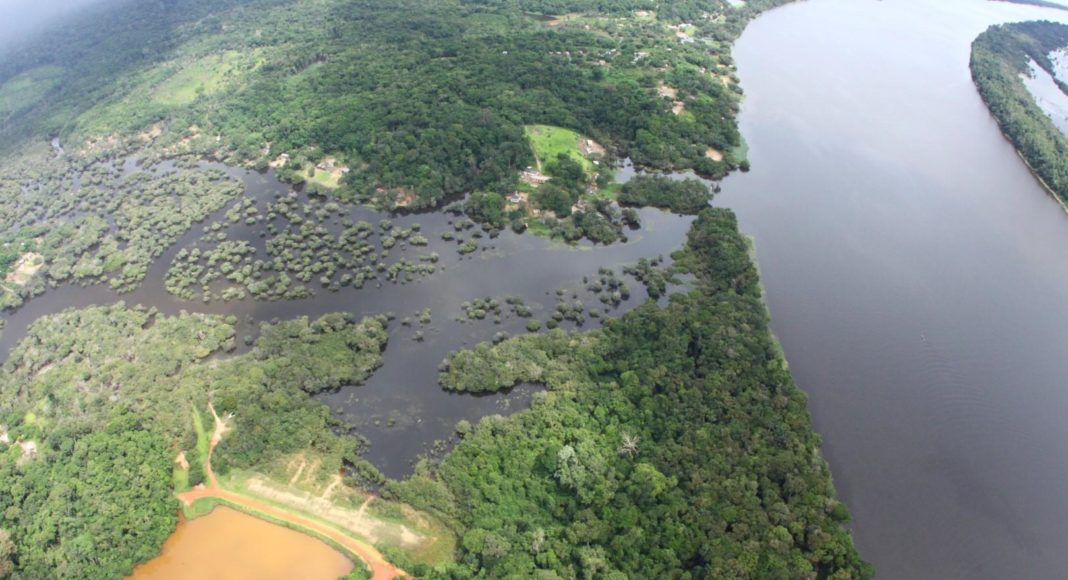4. Company policy: Divide and Rule
MRN, or Mineração Rio do Norte, the bauxite mining company which dominates the extractive industry in Pará, improved the process of ‘stakeholder mapping’ in 2015, according to the company’s financial report. This mapping includes “community leaders, mayors, officer clerks, town councilors, trade unionists, shop-keepers, etc.” In plain language, it is a message to investors that the company has taken every care to prevent conflicts breaking out. Or, put even more clearly:Money talks loudest. We face such difficulties getting people together. We try to put something forward for them and the mining company comes round behind our backs, calls people, sets them to work. And people end up being company toadies. That has happened a lot. –Ari, a quilombola leaderToday, among the quilombolas, there are those who want to block the exploration of new areas, those who accept compensation in exchange for mining and those who are against any initiative that could make things harder for the company. Data from MRN allows us to understand that between 80% and 90% of the employees are from Pará. The problem is that, in general, these people are in the low-paid jobs. For Quilombolas, then, they keep the jobs that require no specialization or academic training, with wages that hover around the minimum set by Brazilian law. It is noticeable how the company acts surgically to divide and rule both people and land.
The mining company is prepared to divide the leadership. Leaders pull people from one side to the other. We keep wondering when we will be able to have our lives back. I have been working as a leader for all these years, I’ve got a following that supports me. These people do not abandon me. –Aluízio Silvério dos SantosIt’s not all just about jobs. The company itself takes care to maintain relations with cooperatives, community associations, municipal governments and the government of Pará in exchange for medical and dental care, education, rural technical assistance and development of economic alternatives.
What we found out is that MRN is carefully placing social projects where they will overshadow any criticisms that communities have assembled. A lot of companies do that. But the way they have done this, going from community to community, is something peculiar to MRN. –Luiz Wanderley, researcherThe complex problem that places the quilombolas and the MRN in opposite corners has, in synthesis, a negative result when it comes to inequality. In a region where blacks have historically been subjected to the logic of exploitation, the mining company’s surgical performance in this territorial dispute produces further asymmetries – social, political and environmental – that hit traditional peoples hard. Some of these impacts are more obvious than others. Such as the conversion of the community members into wage-earners or service providers, through local cooperatives. These are the groups that become more economically dependent on mining and less involved in agro-extractive activities, which undermines their relative autonomy. Thus, with heightened economic dependency and the loss of control over natural resources and land, the disparity of forces in the dispute grows more rapidly. And this is directly related to the physical proximity of mining activities. And considering that the advances of the MRN are made with few significant obstacles in their path, this situation threatens not only the quilombolas of Oriximiná. Even the most distant communities that depend on the forest have much to worry about.
(Edited extract from a report, ‘The secret war for bauxite’, by Tomás Chiaverini for Agencia Pública, translated for LAB by Mike Gatehouse)

Chiaverini interviewed the President and Director of MRN, Silvano Andrade (see photo above). Aged 50, Andrade has an informal and deceptively straightforward manner. Grey haired with a neat crew-cut, he appears constantly red-faced and his colouring is accentuated whenever the conversation takes a difficult turn.
He received our report in the air-conditioned meeting room at the MRN office, with a view out over the port and the black and rusty ships moored up on the Trombetas river. Andrade and his two press officers who accompanied him throughout our conversation, was wearing a khaki shirt with green and yellow uniform patches. There was a certain tension as though the presence of journalists was unusual there. In his seven months with the company, the press officer who accompanied us had never himself been interviewed by reporters.
“Here we work with complete transparency,” said the Director. “You know why? Because here we are within a National Forest. It is forbidden to work in any other way. Any company that failed to work like that would never have lasted for 37 years within a conservation area, under constant surveillance by ICMBio and Ibama.”Transparency, according to Andrade, characterises every process and is extended to the social policies in relation to the quilombolas. “The communities always played their part in Mineraçao Rio do Norte, as important stakeholders (interested parties). We were always close to them and providing them with information,” he says, fully convinced of the integrity of the company he heads.
A conviction which, however, somewhat curtailed our discussion. Confronted with the fact that the company had fenced off land of the Union, and posted armed guards, he at first had no response. “I can’t see why that matters,” he exclaimed. When we restated the question, he claimed that no one was prevented from entering the area. “We have control for reasons of security. There are no restrictions: it is just for i-den-ti-fi-cation,” he went on, separating the syllables to leave no doubt about his meaning. Later, confronted with the charge that the company had set up a unit to work on demobilising the quilombola movement, his conviction increased and he lost his cool for a few moments. “Absolutely not! On the contrary! It’s about dialogue and meeting person to person. How can a meeting called to hear the demands they put forward be a plan to demobilise?” he said, emphatically… “It seems that whatever we do is questioned,” he continued, annoyed. The biggest problems facing the communities of the Trombetas river, according to Andrade, have nothing to do with the presence of the mining company. They relate to the fact that this is a poor region, neglected by the authorities. The quilombolas can testify that the company is playing the role that the State should play.The company, for its part, cannot offer employment to everyone but, according to the president, it does its best. That is why it is investing in a project called Sustainable Territories. In partnership with NGOs it is going to train the public services to better deploy the resources they have. In 2015 R$1.7 million were invested in the project.
According to Andrade, MRN is committed to maintaining the local culture and traditions and is absolutely in favour of the provision of land titles to Alto Trombetas and Alto Trombetas II.
“In the south of Bahia, for example, there are serious problems with supposedly traditional people claiming right to land title and then it being revealed that these people are not ‘traditional’ in any way. But here in this region it’s clear that that is not happening. We recognize that all the people in this area are [traditional] quilombolas who are absolutely legitimate, and we have nothing against that.”He gave his word, also, that prior consultation is always carried out. “It is not called ‘free consultation with prior notice’, as established by the ILO. But there was always a well-established process of dialogue.”
And as far as the environment goes he insisted again on there being complete transparency. The reforestation programs, he said, had been so exemplary that they handed back forest lands in better condition than before. It was possible, for instance, to increase the density of brazil-nut or copaifera trees, which suits the extractive farming of the quilombo communities.
For the president of MRN, it is completely viable to practice mining without damaging the environment. Despite the recent Samarco disaster in Mariana, Minas Gerais, and tragedies such as the pollution of Lake Batata are a thing of the past. “It was done wrongly, but this was permitted under the legislation and mining licences of that time. I believe it was a collective mistake, not just one made by the mining company. But it became clear that it was an error, and it was corrected,” he says.
Finally, after an interview that lasted almost two hours, Andrade offered a final reflection: “Mining is an activity much discriminated against by society in general. I believe that this comes from the time when the Portuguese and the Spaniards came here to extract gold and sliver. That created the idea that mining is a get-rich-quick activity. But what we are doing here, in practical, socio-environmental terms, is a model for all Brazil,” he calimed, rising from the conference table. Before bidding us farewell, he paused for a moment to find the words for a final challenge: “Imagine what the world would be like today, without all the benefits which come from mining.
João Peres is a journalist graduated at the University of São Paulo. He is the author of ‘Corumbiara, caso enterrado’, a book about the massacre that occurred in 1995 in the Brazilian Amazon and was nominated finalist of Prêmio Jabuti, the most relevant literature prize in the country. He is also a former editor of web pages and radios and a reporter specialized on human rights themes. He has covered elections and crisis in Brazil, Argentina, Venezuela, Colombia and Bolivia. Moriti Neto is a journalist and an academic professor. He has been editor and reporter in relevant magazines and web pages, being awarded important prizes for works that have exposed human rights violations and abuse of economic power. As a professor, he coordinated a lab journal uncovering problems related to potable water management in São Paulo, receiving wide appraisal.


